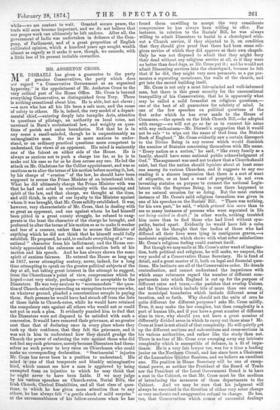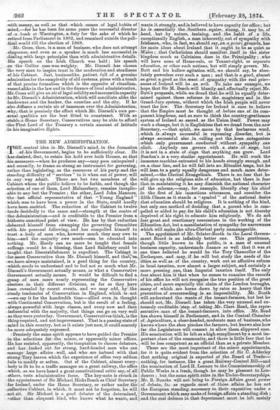MR. ASSHETON CROSS.
mit. DISRAELI has given a guarantee to the party of genuine Conservatives, the party which does not regard " a Conservative Government as an organised hypocrisy," in the appointment of Mr. Assheton Cross to the very critical post of the Home Office. Mr. Cross is beyond everything Conservative, as distinguished from Tory. There is nothing sensational about him. He is able, but not clever ; —a man who has all his life been a safe man, and the cause of safety to others. He is, indeed, the very model of a depart- mental chief,—entering deeply into turnpike Acts, attentive to questions of pilotage, an authority on local rates, not unversed in Burn's ecclesiastical law, and weighty on ques- tions of parish and union boundaries. Not that he is in any sense a small-minded, though he is unquestionably an unimaginative man. No one is more anxious to under- stand, or on ordinary practical questions more competent to understand, the views of an opponent. His mind is eminently one of the fairest on either side of the House. He is always as anxious not to push a charge too far, as he is to make out his case so far as he does accuse any one. He led the attack on Mr. Gladstone for the Collier appointment, and was so cautious as to alter the terms of his motion before moving it, lest, by his charge of " evasion " of the law, he should have been supposed to accuse the Prime Minister of an intentional trick. What he did ultimately charge the Prime Minister with was that he had not acted in conformity with the meaning and spirit of the law, and that charge, we thought at the time, and still think, in spite of our loyalty to the Minister against whom it was brought, that Mr. Cross solidly established. It was, however, very characteristic of Mr. Cross, that in dealing with so great an opponent, and one against whom he had himself been pitted in a great county struggle, he refused to exag- gerate in the least the character of the charge he brought, and preferred to alter the terms of his motion so as to make it weaker and less of a censure, rather than to accuse the Minister of anything which he did not think that he himself could fully establish. He proposed, he said, to exclude everything of a "sen- sational " character from his indictment, and the House cer- tainly appreciated the calmness and moderation both of his motion and his speech. And he has always shown the same spirit of anxious fairness. He entered the House as long ago as 1857, never attempting oratory, never, indeed, for a long time attempting to speak on the greater political subjects of the day at all, but taking great interest in the attempt to suggest, from the Churchman's point of view, compromises which he hoped—not very wisely, perhaps—might be acceptable to the Dissenters. He was very anxious to "accommodate " the ques- tion of Church-rates by conceding an exemption to every one who, on whatever ground, pleaded a conscientious scruple in paying them. Such persons he would have had struck off from the lists
of those liable to Church-rates, while he would have retained the compulsory rate against all others who would not or could not put in such a plea. It evidently puzzled him to find that the Dissenters were not disposed to be satisfied with such a concession. It would have removed their grievance, at no greater cost than that of declaring once in every place where they took up their residence, that they felt the grievance, and it was not in him to understand how they should grudge the Church the power of enforcing the rate against those who did not feel any such grievance, merely because Dissenters had them- selves no such power to levy rates on Churchmen who could make no corresponding declaration. " Sentimental " injuries Mr. Cross has never been in a position to understand. His mind is one of that temperate and blankly unimaginative kind, which cannot see how a man is aggrieved by being exempted from an injustice to which he may think that he ought never to have been liable. If we may judge by his various speeches on Church-rates, Burial Bills, the Irish Church, Clerical Disabilities, and all that class of ques- tions, to which he has given more attention than to any others, he has always felt "a gentle shock of mild surprise" at the unreasonableness of his fellow-creatures when he has found them unwilling to accept the very considerate compromises he has always been willing to offer. For instance, in relation to the Burials' Bill, he was always willing to admit Dissenters to burial in a churchyard with- out a Church service, if they objected to it, on condition that they should give proof that there had been some reli- gious service of which they did approve at their own chapels. Only he was not disposed to admit that they might bury their dead without any religious service at all, as if they were no better than dead dogs, as Mr. Cross put it ; and he would not admit Dissenting services into the churchyard, because he felt that if he did, they might very soon permeate, as a gas per- meates a separating membrane, the walls of the church, and get into the sacred building itself. Mr. Cross is not only a most fair-minded and well-informed man, but there is this great security for the unsensational tranquillity of his Conservatism, that he is apparently what may be called a mild formalist on religious questions,— one of the best of all guarantees for sobriety of mind. In one of the few speeches on political questions of the first order which he has ever made to the House of Commons,—the speech on the Irish Church Bill,—he adopted with energy—we will not go so far as to connect his name with any enthusiasm—Mr. Disraeli's suggestion that it would not be safe " to wipe out the name of God from the Statute Book of England." Mr. Cross evidently saw a certain disrespect to the Divine Being in any course which would diminish the number of Statutes concerning themselves with His name. " Every nation as a nation," he said, " like every family as a family, should have some national public acknowledgment of God." The argument was used not to show that a Churchshould exist, but that the nation should legislate about at least some one among its various Churches, and it suggests to any one reading it a sincere impression that there is a sort of want of etiquette, or at least a want of propriety, in not even inventing statutes on purpose to connect the national Legis- lature with the Supreme Being, in case there happened to be no natural occasion for so doing. But the most carious instance of Mr. Cross's mild religious formalism was given in one of his speeches on the Burials' Bill. " There was nothing, for his own part," he said, " which grieved him more than to see so many instances of persons who were separated in life not being united in death;" in other words, nothing troubled him more than to find those who had lived without sym- pathy, buried apart. Evidently he would have felt a calm delight in the thought that the bodies of those who had differed all their lives were lying in contiguous graves,—a moderate aspiration, which shows with what sober satisfactions Mr. Cross's religious feeling could content itself.
But though we may smile at Mr. Cross's utter want of imagina- tion, both political and religious, he will make, we suspect, the very model of a Conservative Home Secretary. He is fond of detail, and a great master of it, both on legal and financial ques- tions. His instincts are all of the Conservative order. He dreads centralisation, and cannot understand the impatience with which some reformers regard the number of different com- partments into which England is cut up for the purpose of different rates and taxes,—the parishes that overlap Unions, and the Unions which include bits of more than one county, the municipal boundaries which include different areas of taxation, and so forth. Why should not the units of area be quite different for different purposes ? asks Mr. Cross mildly.
True, it may make the law complex, but then complexity is a part of human life, and if you have a great number of different aims in view, why should you not have a great number of differently divided areas in which to carry out those aims I Mr.
Cross at least is not afraid of that complexity. He will quietly get up the different sections and sub-sections and cross-sections in his various authorities, and rather like the study than not.
There is no fear of Mr. Cross ever sweeping away any intricate complexity which is susceptible of defence, in a fit of impa- tience. He is a very fair lawyer too, was for a time a leading junior on the Northern Circuit, and has since been a Chairman of the Lancashire Quarter Sessions, and we believe an excellent one. His position as Home Secretary will be one of excep- tional power, as neither the President of the Board of Trade nor the President of the Local Government Board is to have a seat in the Cabinet, so that Mr. Cross must be the medium of introducing the measures of those departments to the Cabinet. And we may be sure that his judgment will always be exercised in the direction of either very sober change or very moderate and unaggressive refusal to change. He has, too, that Conservatism which comes of successful dealings with money, as well as that which comes of legal habits of mind,—for he has been for some years the successful director of a bank at Warrington, a duty for the sake of which he retired from Parliament in 1862, and remained outside the poli- tical world till the election of 1868.
Mr. Cross, then, is a man of business, who does not attempt eloquence, and even as a speaker is much less successful in dealing with large principles than with administrative details. His speech on the Irish Church was bald ; his speech
on the Collier case was weighty. Mr. Disraeli has chosen the very man to inspire trust in the moderation and steadiness of his Cabinet. Just, businesslike, patient, full of a genuine admiration for the complexity of old customs, pious with a touch of that precise formalism which is the opposite of ritualism, versed alike in the law and in the finance of local administration, Mr. Cross will give an air of legal solidity and mercantile capacity to.Mr. Disraeli's Administration, which will conciliate alike the landowner and the banker, the counties and the city. If he also diffuses a certain air of tameness over the Administration, why, that is precisely the effect which Mr. Disraeli's own per- sonal qualities are the best fitted to counteract. With so stable a Home Secretary, Conservatives may be able to afford the First Lord of the Treasury a certain amount of latitude in his imaginative flights.



































 Previous page
Previous page